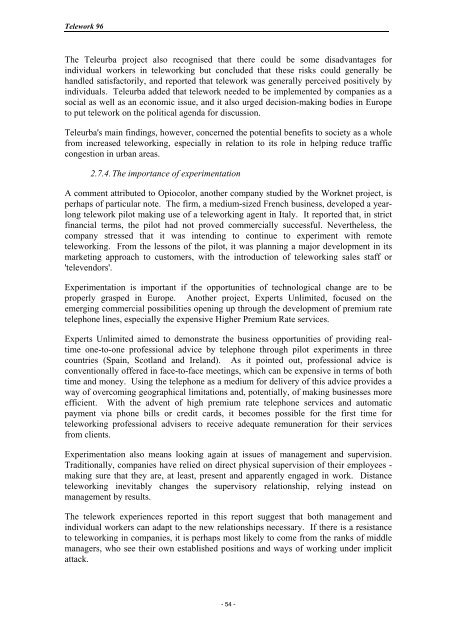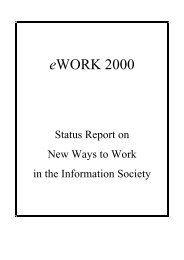1996 - European Telework Week
1996 - European Telework Week
1996 - European Telework Week
- No tags were found...
You also want an ePaper? Increase the reach of your titles
YUMPU automatically turns print PDFs into web optimized ePapers that Google loves.
<strong>Telework</strong> 96<br />
The Teleurba project also recognised that there could be some disadvantages for<br />
individual workers in teleworking but concluded that these risks could generally be<br />
handled satisfactorily, and reported that telework was generally perceived positively by<br />
individuals. Teleurba added that telework needed to be implemented by companies as a<br />
social as well as an economic issue, and it also urged decision-making bodies in Europe<br />
to put telework on the political agenda for discussion.<br />
Teleurba's main findings, however, concerned the potential benefits to society as a whole<br />
from increased teleworking, especially in relation to its role in helping reduce traffic<br />
congestion in urban areas.<br />
2.7.4. The importance of experimentation<br />
A comment attributed to Opiocolor, another company studied by the Worknet project, is<br />
perhaps of particular note. The firm, a medium-sized French business, developed a yearlong<br />
telework pilot making use of a teleworking agent in Italy. It reported that, in strict<br />
financial terms, the pilot had not proved commercially successful. Nevertheless, the<br />
company stressed that it was intending to continue to experiment with remote<br />
teleworking. From the lessons of the pilot, it was planning a major development in its<br />
marketing approach to customers, with the introduction of teleworking sales staff or<br />
'televendors'.<br />
Experimentation is important if the opportunities of technological change are to be<br />
properly grasped in Europe. Another project, Experts Unlimited, focused on the<br />
emerging commercial possibilities opening up through the development of premium rate<br />
telephone lines, especially the expensive Higher Premium Rate services.<br />
Experts Unlimited aimed to demonstrate the business opportunities of providing realtime<br />
one-to-one professional advice by telephone through pilot experiments in three<br />
countries (Spain, Scotland and Ireland). As it pointed out, professional advice is<br />
conventionally offered in face-to-face meetings, which can be expensive in terms of both<br />
time and money. Using the telephone as a medium for delivery of this advice provides a<br />
way of overcoming geographical limitations and, potentially, of making businesses more<br />
efficient. With the advent of high premium rate telephone services and automatic<br />
payment via phone bills or credit cards, it becomes possible for the first time for<br />
teleworking professional advisers to receive adequate remuneration for their services<br />
from clients.<br />
Experimentation also means looking again at issues of management and supervision.<br />
Traditionally, companies have relied on direct physical supervision of their employees -<br />
making sure that they are, at least, present and apparently engaged in work. Distance<br />
teleworking inevitably changes the supervisory relationship, relying instead on<br />
management by results.<br />
The telework experiences reported in this report suggest that both management and<br />
individual workers can adapt to the new relationships necessary. If there is a resistance<br />
to teleworking in companies, it is perhaps most likely to come from the ranks of middle<br />
managers, who see their own established positions and ways of working under implicit<br />
attack.<br />
- 54 -








